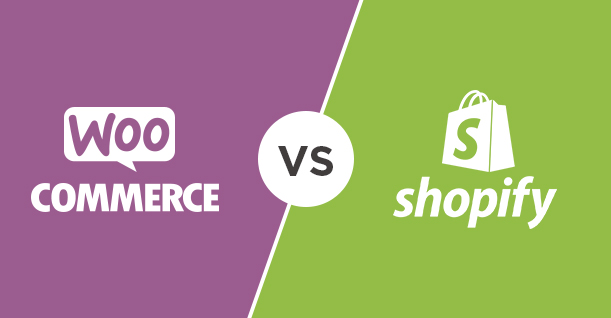
The online shopping world has boomed, making it easier than ever to start your own business and sell your amazing products! Choosing the right platform between Shopify and WooCommerce can feel overwhelming, each with their own strengths to help you turn your dream store into reality.
Shopify and WooCommerce have become game-changers in the world of online stores. Shopify is like an all-in-one solution – it’s user-friendly and has everything you need built right in. WooCommerce is more flexible, like a build-it-yourself store, and works seamlessly with WordPress, a popular website building platform.
Let’s look at some key features of each platform to help you decide which one is the perfect fit to launch your e-commerce dream!
1. Ease of Use
Shopify vs. WooCommerce: Ease of Use Comparison
Shopify is like a pre-built store that’s super easy to use. It has drag-and-drop tools to move things around, beautiful templates to get you started, and a simple setup process. This makes it a great choice for beginners who want to jump right in.
WooCommerce is more powerful, but it takes a little more effort to get going. Think of it like building your own store from scratch. It works with WordPress, a popular website platform, but you’ll need some tech knowledge to set things up, like finding a hosting provider and installing plugins. While this gives you more control, it can be a steeper learning curve for beginners.
Ease of Use Comparison
| Feature | Shopify | WooCommerce |
|---|---|---|
| User-Friendly Interface | Yes, with drag-and-drop builder. | Requires basic WordPress and e-commerce knowledge. |
| Setup Process | Straightforward and quick. | Requires hosting setup, domain management, and plugin installation. |

2. Customization and Flexibility
Shopify vs. WooCommerce: Customization and Flexibility Comparison
Customization and flexibility are essential for creating a unique and personalized online store that aligns with your brand identity and customer experience. Shopify offers a range of customizable themes, templates, and built-in tools to design and modify your store, allowing you to tailor layouts, colors, fonts, and add custom code to meet your specific requirements. WooCommerce provides unparalleled customization and flexibility with access to thousands of WordPress themes, plugins, and extensions, enabling you to create a fully customized and scalable e-commerce store tailored to your business needs and preferences.
Customization and Flexibility Comparison
| Feature | Shopify | WooCommerce |
|---|---|---|
| Themes and Templates | Limited selection of customizable themes. | Access to thousands of WordPress themes and plugins. |
| Customization Options | Built-in tools with limited customization. | Unlimited customization with plugins, extensions, and custom code. |
3. Pricing and Plans
Shopify vs. WooCommerce: Pricing and Plans Comparison
Pricing is a critical factor to consider when choosing an e-commerce platform, as it directly impacts your budget, costs, and overall profitability. Shopify offers various pricing plans, including Basic, Shopify, Advanced Shopify, and Shopify Plus, with monthly subscription fees ranging from $29 to $299, plus transaction fees for online payments and credit card processing. WooCommerce, being open-source, is free to use with WordPress, but you’ll need to consider costs for hosting, domain, themes, plugins, and extensions, which can vary depending on your requirements and customization needs.
Pricing and Plans Comparison
| Feature | Shopify | WooCommerce |
|---|---|---|
| Monthly Subscription Fees | $29 to $299, plus transaction fees. | Free, but additional costs for hosting, domain, themes, plugins, and extensions. |
| Transaction Fees | Varies based on plan and payment gateway. | No transaction fees, but payment gateway fees apply. |
4. Scalability and Performance
Shopify vs. WooCommerce: Scalability and Performance Comparison
As your online store gets more popular and attracts more customers, you need a platform that can keep up! This is where scalability and performance come in. Imagine your store on a busy shopping day – you need it to run smoothly and quickly, no matter how many people visit.
Shopify offers reliable hosting with unlimited bandwidth, fast loading speeds, and scalable infrastructure, ensuring optimal performance and uptime for your online store, even during peak traffic and sales periods. WooCommerce, being self-hosted, requires you to choose a reliable hosting provider and optimize your website, including caching, CDN, and database management, to ensure fast loading speeds, high performance, and scalability for your e-commerce store.
Scalability and Performance Comparison
| Feature | Shopify | WooCommerce |
|---|---|---|
| Hosting and Infrastructure | Reliable hosting with scalable infrastructure. | Requires choosing a reliable hosting provider and website optimization. |
| Performance and Loading Speeds | Fast loading speeds and optimal performance. | Requires optimization, caching, CDN, and database management. |

5. Payment Gateways and Transactions
Shopify vs. WooCommerce: Payment Gateways and Transactions Comparison
Payment gateways and transactions are critical for processing online payments, managing orders, and ensuring a seamless and secure checkout experience for your customers. Shopify offers built-in payment gateways like Shopify Payments, along with support for third-party payment providers, enabling you to accept credit/debit cards, digital wallets, and alternative payment methods with ease and security. WooCommerce supports various payment gateways, including PayPal, Stripe, Square, and more, through extensions and plugins, allowing you to offer multiple payment options, manage transactions, and integrate with accounting and financial systems.
Payment Gateways and Transactions Comparison
| Feature | Shopify | WooCommerce |
|---|---|---|
| Built-in Payment Gateways | Shopify Payments and third-party providers. | Supports multiple payment gateways through extensions and plugins. |
| Transaction Fees | Varies based on plan and payment gateway. | No transaction fees, but payment gateway fees apply. |
6. SEO and Marketing Tools
Shopify vs. WooCommerce: SEO and Marketing Tools Comparison
SEO and marketing tools are essential for driving traffic, attracting customers, and increasing sales through organic search, social media, and other digital channels. Shopify offers built-in SEO tools, including customizable meta tags, alt text, sitemaps, and mobile optimization, along with integrated marketing features like email marketing, social media integration, and promotional tools to help you reach and engage your target audience effectively. WooCommerce provides SEO-friendly features, including customizable permalinks, SEO plugins like Yoast SEO, All in One SEO Pack, and Rank Math, along with marketing extensions for email campaigns, social media sharing, affiliate marketing, and retargeting to optimize your online store for search engines and drive targeted traffic to your website.
SEO and Marketing Tools Comparison
| Feature | Shopify | WooCommerce |
|---|---|---|
| SEO Tools and Optimization | Built-in SEO tools and mobile optimization. | SEO-friendly features and plugins for customization. |
| Marketing and Promotion | Integrated marketing features and promotional tools. | Marketing extensions for email campaigns, social media, and affiliate marketing. |

7. Support and Customer Service
Shopify vs. WooCommerce: Support and Customer Service Comparison
No matter how user-friendly a platform is, sometimes things go wrong. Especially if you’re new to building websites or online stores, good customer service is like having a helping hand nearby. They can answer your questions, fix any hiccups, and make sure your experience is smooth and frustration-free.
Shopify offers 24/7 customer support, help center, community forums, and guides with articles, tutorials, and resources to assist users with technical issues, best practices, and troubleshooting. WooCommerce provides community forums, documentation, tutorials, and third-party support with experts, developers, and agencies specializing in WooCommerce to help users with setup, customization, and ongoing maintenance of their online stores.
Support and Customer Service Comparison
| Feature | Shopify | WooCommerce |
|---|---|---|
| Customer Support | 24/7 customer support, help center, and guides. | Community forums, documentation, tutorials, and third-party support. |
Conclusion
Alright, you’ve narrowed it down to the final two! We compared Shopify and WooCommerce across 7 important features, and it turns out they both have something special to offer.
Shopify is like a pre-built online store that’s super easy to use. It has everything you need built right in, with helpful customer service to answer your questions if you get stuck. This makes it a great choice for beginners or anyone who wants a hassle-free solution.
WooCommerce is more powerful and flexible, but it takes a little more effort to set up. Think of it like building your own store from scratch. You have tons of options to customize everything, but it might require some help from a techy friend.
Choose Shopify if you want something easy to use and get started with. But if you want more control and customization options, and don’t mind a bit of a learning curve, WooCommerce could be the perfect fit!


